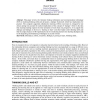Free Online Productivity Tools
i2Speak
i2Symbol
i2OCR
iTex2Img
iWeb2Print
iWeb2Shot
i2Type
iPdf2Split
iPdf2Merge
i2Bopomofo
i2Arabic
i2Style
i2Image
i2PDF
iLatex2Rtf
Sci2ools
CSCL
2006
2006
A dialogic understanding of the relationship between CSCL and teaching thinking skills
This paper reviews the literature linking information and communications technology (ICT) to teaching thinking skills and advocates a dialogic framework which has implications for practice. The computer supported collaborative learning (CSCL) movement is critiqued for not always taking into account the radical implications of the concept of `dialogic' which is the idea that meaning-making requires the inter-animation of more than one perspective. It is argued that dialogue and dialogic is the key to `learning to learn' and other higher order thinking skills and that the unique features of ICT particularly suit it to inducting learners into learning dialogues and to the deepening and broadening of dialogues as an end in itself.
| Added | 11 Dec 2010 |
| Updated | 11 Dec 2010 |
| Type | Journal |
| Year | 2006 |
| Where | CSCL |
| Authors | Rupert Wegerif |
Comments (0)

